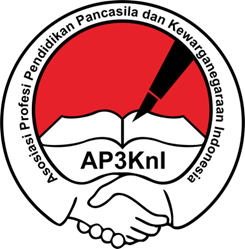Efektifitas Pembelajaran PPKn dengan Pendekatan Saintifik pada SMP Negeri 40 Makassar
DOI: https://doi.org/10.26618/jed.v3i2.1628
Abstract
The study aims at obtaining the description of the effectiveness of PPKn learning using scientific approach at SMPN 40 Makassar viewed from its implementation including (1) observing, (2) questioning, (3) experimenting, (4) associating, and (5) communicating. This study is descriptive qualitative research that describes the result of the study by describing the actual data obtained from the effectiveness of PPKn learning using scientific approach at SMPN 40 Makassar. The data source is selected by employing purposive sampling technique. Data is collected through interview, observation, and documentation. Data is analyzed using descriptive qualitative analysis by conducting data reduction, data presentation, conclusion or verification. The results of the study of the effectiveness of PPKn learning using scientific approach at SMPN 40 Makassar indicate that (1) the scientific approach in PPKn learning at SMPN 40 Makassar at the stage of observing, questioning, experimenting, associating, and communicating had been conducted effectively, (2) the scientific approach is yet to make the PPKn learning effective at SMPN 40 Makassar, proved by the implementation of learning activity using scientific approach that there are constraints face by the teacher and students, the students are not active yet in following the learning process, and it has yet to achieve PPKn learning objective using scientific approach.
Keywords : Effectiveness of learning, scientific approach.
References
Abdul Kadir, dkk. 2012. Dasar-Dasar Pendidikan. Jakarta: Prenada Media Group.
Daruma Razak, dkk. 2005. Perkembangan Peserta Didik. Makassar: Penerbit FIP-UNM.
Handoko & T. Hani. 2001. Manajemen. Yogyakarta: BPFE UGM.
Iskandar Wiryokusumo & J. Mandalika, ed. 1982. Kumpulan Pikiran-Pikiran Dalam Pendidikan. Jakarta: Rajawali Pers.
Maharuddin Pangewa. 2010. Perencanaan Pembelajaran. Makassar: Badan Penerbit UNM.
Martinis Yamin. 2003. Strategi Pembelajaran Berbasis Kompetensi. Ciputat: GP Press.
Muis Saad & Iman. 2004. Pendidikan Parsitipatif. Jakarta: Safira Insania Press.
Muhibbin Syah. 2004. Psikologi Pendidikan Dengan Pendekatan Baru. Bandung: Rosda.
Muhmidayeli. 2011. Filsafat Pendidikan. Bandung: PT Refika Aditama.
Rusman. 2011. Model-Model Pembelajaran Mengembangkan Profesionalisme Guru. Jakarta: Rajawali Pers.
Redja Mudyaharjo. 2001. Pengantar Pendidikan. Jakarta: PT Raja Grafindo Persada.
Sutarjo Adisusilo. 2013. Pembelajaran Nilai Karakter. Jakarta: Rajawali Pers.
Sardiman. 2011. Interaksi dan Motivasi Belajar Mengajar. Jakarta: Rajawali Pers.
Steers & Richard M. et.al. 1985. Efektivitas Organisasi. Jakarta: Erlangga.
Sukmadinata & Nana S. 2002. Pengendalian Mutu Sekolah Menengah: Konsep, Prinsip, dan Instrumen. Bandung: Remaja Rosda Karya.
Sugiyono. 2010. Statistika Untuk Penelitian. Bandung: Alfabeta.
Syamsul Bachri Thalib. 2010. Psikologi Pendidikan Berbasis Analisis Empiris Aplikatif. Jakarta: Kencana.
Sugiyono. 2013. Metode Penelitian Pendidikan, Pendekatan Kuantitatif, Kualitatif, dan R&D. Bandung: Alfabeta.
Schunk Dale H, dkk. 2012. Motivasi Dalam Pendidikan, Teori, Pendidikan Dan Aplikasi. Jakarta: PT Indeks.
The Liang Gie. 1989. Ensiklopedi Administrasi. Jakarta: PT Air Agung Putra.
Wachyu Sundayana. 2014. Pembelajaran Berbasis Tema. Jakarta: Erlangga.
Wina Sanjaya. 2006. Strategi Pembelajaran Berorientasi Standar Proses Pendidikan. Jakarta: Kencana.



